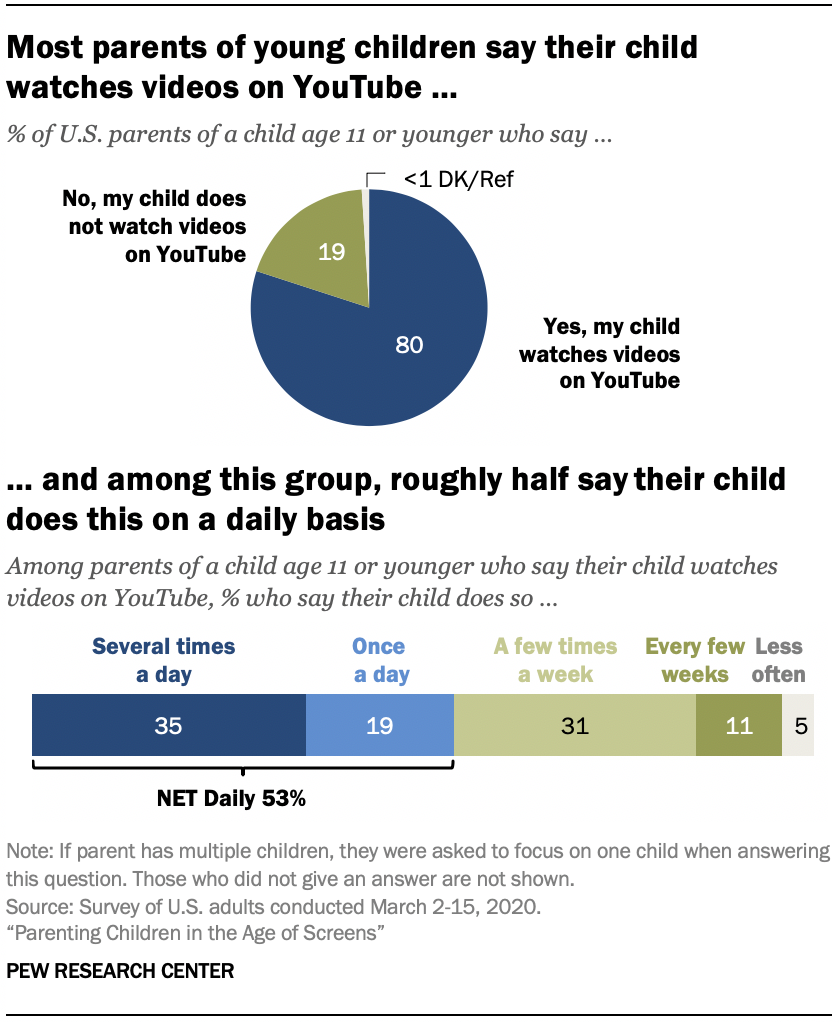
According to YouTube, 1 billion hours of videos are watched on the site every day, and the platform has over 2 billion users. The video site has also emerged as a key platform in providing content for children. Fully 80% of all parents with a child age 11 or younger say their child ever watches videos on YouTube, with 53% reporting that their child does this daily, including about a third who say this happens several times a day (35%). (For these questions, parents who have more than one child in this age range were randomly assigned to focus on one of their children.)
While parents of an older child are more likely to say their child views content on YouTube, this is a common activity for even the youngest of children. Roughly nine-in-ten parents of a child age 5 to 11 (89%) report that their child does this, compared with 81% of those with a child age 3 to 4 and 57% of those who have child age 2 or younger. However, the age of the child does not appear to impact the frequency of YouTube viewing. For example, 50% of parents of a child age 4 or younger say their child watches YouTube videos daily, compared with 55% of parents of a child age 5 to 11.
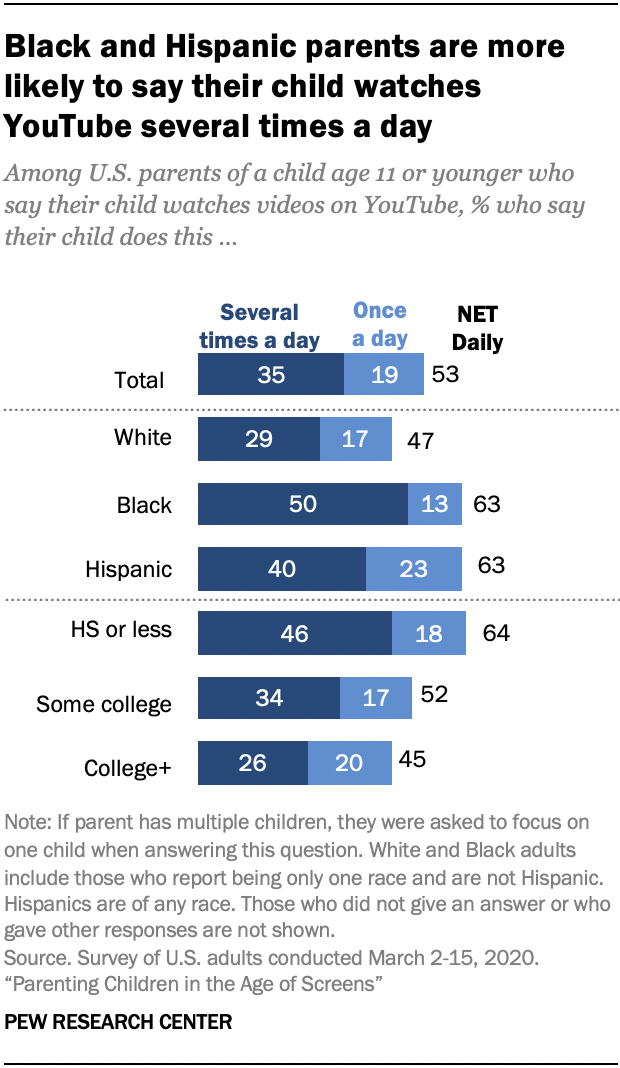
Majorities across demographic groups report that their child ever watches videos on YouTube, but how often their child does this varies substantially by race and ethnicity. Half of Black parents and 40% of Hispanic parents say their child age 11 or younger who watches YouTube videos does so several times a day, compared with 29% of white parents. In total, majorities of Black parents and Hispanic parents (63% each) say this child watches content on YouTube on a daily basis, compared with 47% of white parents.
Parents who have lower levels of educational attainment are also more likely to say their YouTube-using child is a frequent viewer of the platform’s content. Roughly two-thirds of these parents who have a high school education or less (64%) say their child watches videos on the platform daily, compared with 52% of those with some college experience and 45% of those with a bachelor’s or advanced degree.
These educational differences are present when looking at parents of the most frequent YouTube-watching children, with parents who have a high school educational or less (46%) being more likely than those with some college experience (34%) or a college degree or more (26%) to say their child watches YouTube content several times a day.
Most parents say YouTube keeps their child entertained, helps them learn new things; nearly half say their child has encountered inappropriate videos there
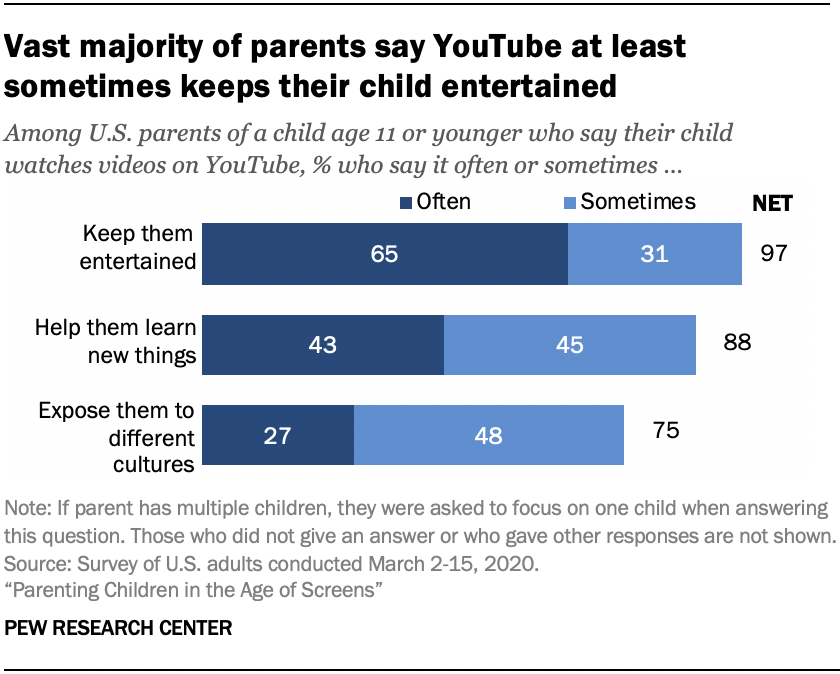
The majority of parents who have a child under the age of 12 who watches YouTube find some benefits from their child’s use of the platform.
Among these parents, nearly all (97%) say this platform keeps their child entertained at least sometimes, including 65% who say this happens often. Large shares of these parents also say YouTube often (43%) or sometimes (45%) helps their child learn new things. Three-quarters say the platform at least sometimes exposes their child to different cultures, though only about one-quarter (27%) say this is often the case.
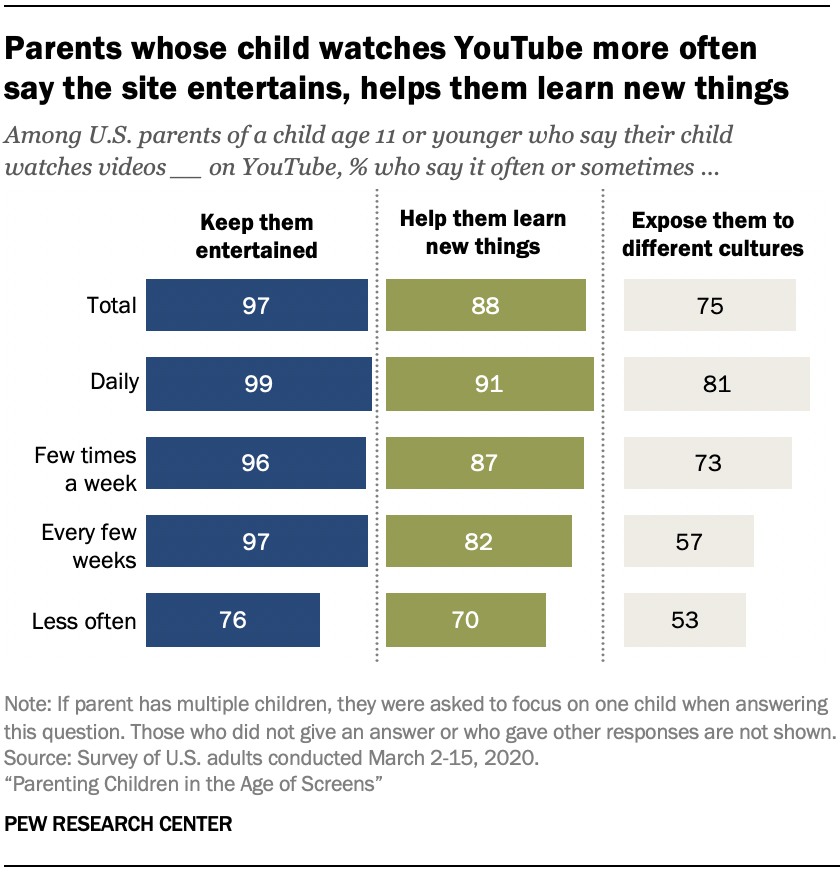
Parents who have a child that watches YouTube videos on a daily basis are more likely to say YouTube provides these types of experiences for their child. This is particularly true when parents are asked how often YouTube videos expose their child to different cultures. Fully 81% of parents who say their child age 11 or younger watches YouTube videos at least daily are more likely to say this content exposes their child to different cultures, compared with smaller shares of parents who say their child watches YouTube videos every few weeks (57%) or less often than that (53%). This trend holds when parents are asked about YouTube helping their child learn new things.
Views about the benefits of YouTube are relatively consistent across demographic groups. However, Black (87%) and Hispanic parents (80%) are more likely than white parents (70%) to say YouTube at least sometimes exposes their child to different cultures. Parents with lower levels of education are also more likely to hold this view – with eight-in-ten parents with some college experience or less (80%) saying their child often or sometimes is exposed to different cultures on YouTube, compared with 67% of those with a college degree or higher.
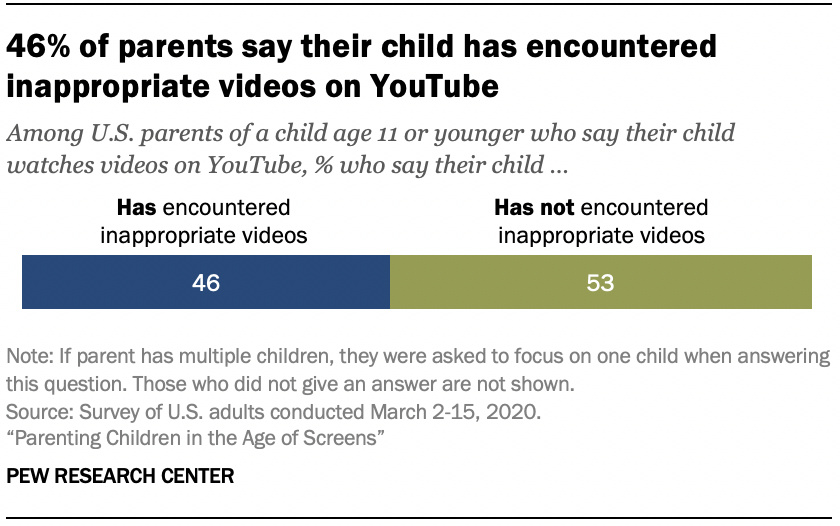
Though many parents find YouTube videos to be entertaining and educational, more than four-in-ten parents (46%) say their child age 11 or younger who uses this platform has encountered videos on YouTube that were inappropriate for their age. Parents of an older child, age 5 to 11 (56%), are more likely to say their child has encountered inappropriate videos on YouTube than parents of a child 4 or younger (28%).
Beyond actual problems reported, parents of YouTube-watching children have concerns about the things their children encounter. The most common concern for parents who have a child age 11 or younger is that their child will encounter inappropriate content (73%), while 68% are very or somewhat concerned about the types of things being advertised to their child on the platform.
Some 65% of parents at least somewhat concerned about the types of videos being recommended to their children on YouTube.
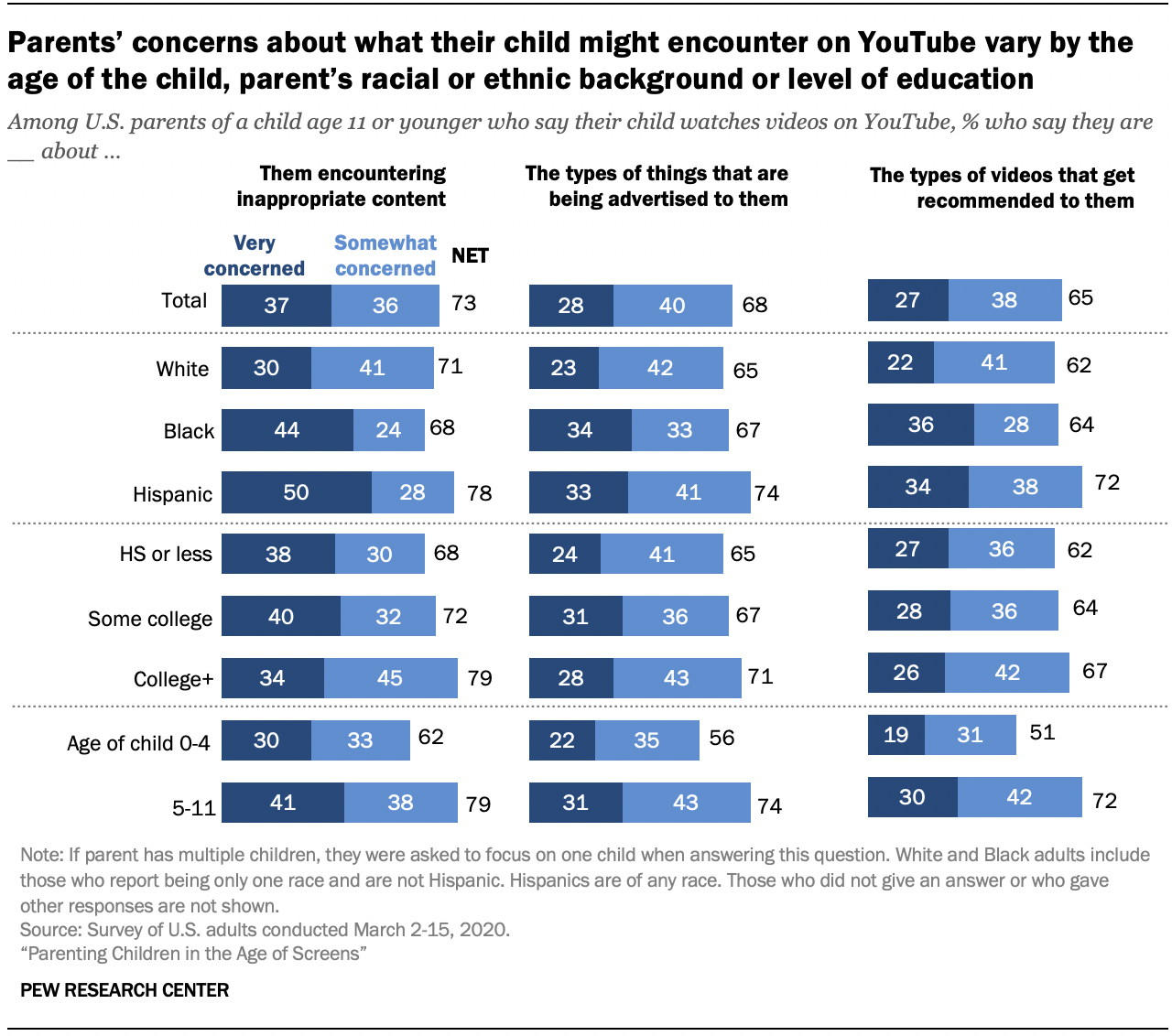
These concerns vary by demographics, especially by race and ethnicity and parental education level, but the starkest difference is by the age of the child. Roughly seven-in-ten parents of a YouTube-watching child 5 to 11 years old are very or somewhat concerned about the types of videos being recommended to their child on YouTube, compared with roughly half (51%) of parents of children ages 4 and younger. A similar trend continues across the other potential concerns, with parents of a relatively older child reporting more concern than parents of a child age 4 or younger – by gaps of 17 percentage points or more.
Overall, across races and ethnicities, majorities of parents of a child age 11 or younger who watches videos on YouTube say they are at least somewhat concerned about these things. However, there are significant differences when looking at level of concern. For example, Hispanic parents (50%) are far more likely than white parents (30%) to say they are very concerned about this child encountering inappropriate content on YouTube – a difference of 20 percentage points.
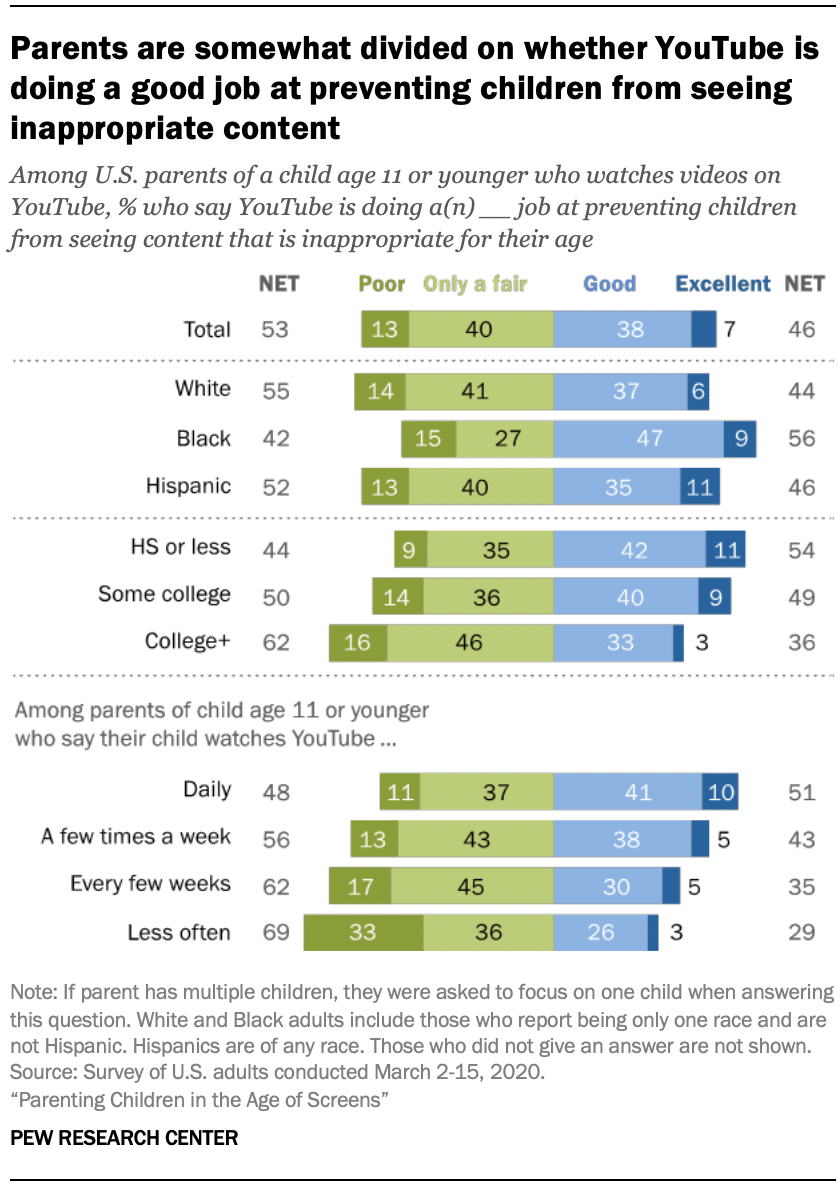
Additionally, those with higher levels of educational attainment are more concerned about their child encountering inappropriate content on the platform and about the types of things being advertised to them. Roughly eight-in-ten parents with a college degree or higher (79%) are very or somewhat concerned about their child encountering inappropriate content on YouTube, while 68% of parents with a high school diploma or less say the same.
When it comes to the effort YouTube is making to keep the platform safe for children, some 46% of parents who have a child under the age of 12 that uses YouTube say the video-sharing site is doing a good or excellent job. A somewhat larger share (53%) believes it to be only a fair or poor job.
Parents’ assessments of how well YouTube is doing in this area varies by their level of education, race and ethnicity, and the frequency with which their child uses the platform.
Among parents who have a child who watches YouTube, those with a high school education or less (54%) or some college experience (49%) are more likely to say YouTube is doing a good or excellent job at preventing children from seeing inappropriate content than those with a bachelor’s degree or more (36%).
Black parents (56%) who have a child that watches content on YouTube are also more likely than white parents (44%) to say YouTube is doing at least a good job at preventing children from seeing content that is inappropriate for their age. Some 46% of Hispanic parents say the same.
There are also differences by the amount of time a parent says their child watches content on YouTube. Parents who say their child watches YouTube at least daily (51%) are more likely to say the platform is doing an excellent or good job of preventing children from seeing inappropriate content than parents who say their child watches YouTube every few weeks (35%) or less often (29%).




